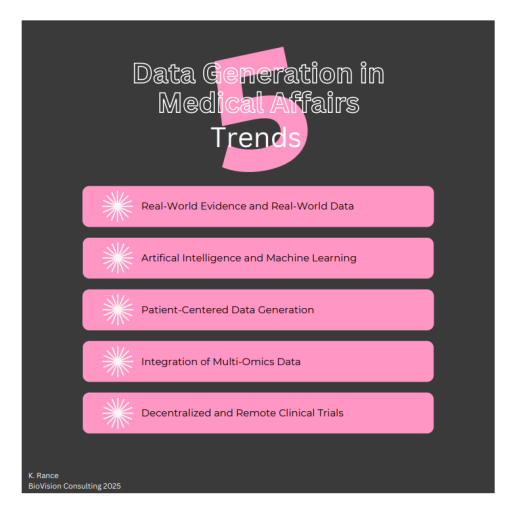
The Future of AI in Medical Affairs: Transforming Healthcare
The future of medical affairs and data generation is evolving rapidly, and several trends are shaping how medical affairs teams will operate in the coming years. Here’s an overview of key developments:
Increasing Use of Real-World Data (RWD) and Real-World Evidence (RWE)
- Real-World Data (RWD) Health data from everyday clinical practices, such as EHRs, claims, registries, and wearables.
- Real-World Evidence (RWE) The analysis of RWD to inform decisions on treatment effectiveness and outcomes in real-life settings.
- The future of medical affairs will involve using RWD and RWE to make more accurate, patient-centered decisions about drug effectiveness, safety, and long-term outcomes.
Personalized Medicine and Precision Data
- Personalized medicine is the idea of tailoring healthcare treatments to individual patients based on their genetic makeup, lifestyle, and other personal factors.
- In the future, medical affairs teams will need to manage large datasets that include genetic information, biomarkers, and patient-reported outcomes to create personalized treatment plans.
- ?With advancements in genomics and data analytics, medical affairs will play a larger role in integrating these data into clinical decision-making.
Digital Tools and Artificial Intelligence (AI) in Data Analysis
- AI and machine learning will help analyze large, complex data sets for pattern recognition and predictive modeling.
- Collaboration between medical affairs professionals and data scientists will be essential.
- Insights from AI will inform strategies for treatment development, market access, and patient engagement.
Enhanced Patient Engagement and Digital Platforms
- Use of mobile apps and wearables to collect patient-generated data.
- Medical affairs will utilize this data for clinical trials, post-market surveillance, and improving care outcomes.
- Digital platforms will support patient interactions and feedback loops.
Integration of Data Across the Healthcare Ecosystem
- Future systems will connect clinical, insurance, patient-reported, and pharmacovigilance data.
- Medical affairs will help ensure seamless, secure sharing of this data across stakeholders.
Increased Focus on Value-Based Healthcare
- Focus on outcomes-based payment models over service-based models.
- Medical affairs will be responsible for collecting evidence on long-term effectiveness, quality of life, and economic value of therapies.
Data Privacy and Security
- Stronger emphasis on compliance with HIPAA, GDPR, and other global privacy regulations.
- Medical affairs teams will work with IT and legal teams to ensure data security and ethical data use.
Collaboration with External Partners
- Partnerships with academia, tech firms, regulators, and healthcare systems will grow.
- These collaborations will streamline drug development and accelerate time-to-market.
Evidence Generation and Support for Market Access
- Medical affairs will generate real-world evidence, economic data, and patient insights to support payer and regulatory decision-making.
- Demonstrating therapeutic value will be essential in a value-driven healthcare landscape.
Summary
The future of medical affairs and data generation will revolve around real-world evidence, personalized medicine, AI-driven insights, and a focus on value-based healthcare. Medical affairs teams will become more involved in analyzing diverse, complex data sources and using this information to drive patient-centered care, market access, and evidence-based decision-making. Data privacy, collaboration, and the integration of digital tools will also shape how medical affairs professionals navigate the healthcare landscape.
Leave a Comment
Empowering Innovation in Medical Affairs
Connect with BioVision experts and discover personalized solutions that fit your needs.
Get In Touch With BioVision

